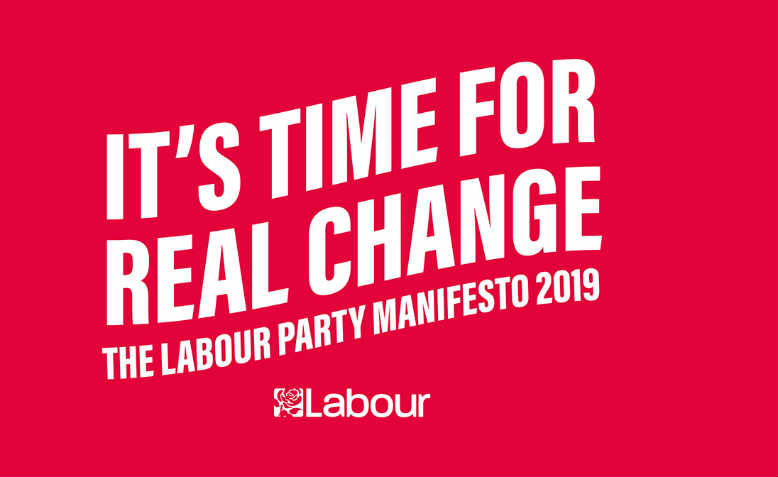 The 2019 manifesto. Image: The Labour party
The 2019 manifesto. Image: The Labour party
Lindsey German on Labour’s manifesto and private landlords in modern Britain
Overall a very good manifesto and one which will strike fear into the hearts of the rich and powerful. Tory Andrew Mitchell described it as ‘socialism red in tooth and claw.’ They have spent so long boosting the rich, attacking workers, praising the privatisation of everything that they shudder at the relatively modest and limited moves towards nationalisation and taxation. Indeed George Osborne’s Evening Standard editorial claimed that many of these ideas – for example taking control of BT Openreach – had been thought of by himself and David Cameron before Labour, but they were unworkable.
It is so refreshing to hear serious promises of massive increases in council housing, decent public sector pay rises, sectoral collective bargaining, a rise in wages overall, nationalisation of rail and utilities, properly funded social care. The cry from the right that we can’t afford it is less credible given firstly that the Tories spend considerable sums on projects that they want and which are a huge boost to private industry which is underwritten by the state, and secondly because there is a widespread sense that large sums of money need to be spent on a crumbling, privatised and austerity-hit infrastructure.
This manifesto is already making waves and will change the terms of debate. It will almost certainly be a boost to Labour’s standing in the polls because people are fed up with the status quo. But we will also find that Labour’s enemies have a two-pronged strategy over this – to hype up their own spending increases so making it look as though everyone is just making false and meaningless promises over what they will do, and to claim that Labour will tax all of us, not just the rich. The whole barrage of arguments from the media, big business and the right-wing parties will continue, and Labour will have to fight hard to put its own narrative.
It has the advantage of the huge numbers out canvassing and campaigning for Labour. Against it are virtually the whole of the national print media, and I don’t see much sign of the level playing field expected during elections from the broadcast media. But Labour will start with millions of people in Britain attracted by these policies which speak directly to them.
There are clear and simple messages in this manifesto and they need to be the attack lines on Johnson and his crew. One prong of Labour’s attack has to be not just on the Tories but also on the Lib Dems who are making it clear that they would back up a minority Tory government but never a Corbyn-led Labour one. Ed Davey’s recent pronouncements on this make it ever more clear that these people are pro-business Tories. A vote for Swinson is a vote for Johnson – end of.
Less welcome in the manifesto are areas where Labour has compromised too far – on green policies, on immigration restrictions but in addition over foreign policy. I have always argued that foreign policy is domestic policy in an old imperial power like Britain, and Labour accepts the status quo or tries to ignore these questions at its peril.
Labour is bad on Nato, Trident and unilateral disarmament. And though banning arms sales to Israel is welcome, most of the foreign policy section of the manifesto is not radical at all. This is not what Jeremy Corbyn thinks, and not what his left supporters elected him to do. It isn’t what should happen in a left party.
Some daylight on the landlord scandal
There was an absolutely shocking story in my local paper this week – and it sums up so much of what is wrong with Britain today. The story was about how some tenants were seeing daylight for the first time in 3 years. The reason? The landlord had sold advertising space and allowed the company to place hoardings on two sides of his building, blocking windows. It was only this week that the hoardings were taken down following a big campaign.
I go past the site at Dalston Junction several times a week and had always assumed that the building – a former pub several stories high – had no one living behind those windows. Not so. Tenants – some of them waiting to be rehoused by other London councils – were denied light all that time. The council has been particularly feeble on this, saying that it wasn’t easy to prosecute. But it should have just taken over the building and told to landlord where to go.
It’s only thanks to local Greens, community campaigners and the Labour councillor that anything happened. But if this isn’t against the law it should be. And Labour councils should be ashamed at what they let private landlords get away with. They should be the last bastion against this sort of behaviour but slums are growing in London along with private landlords. Labour if it gets into office really has to limit their power.

